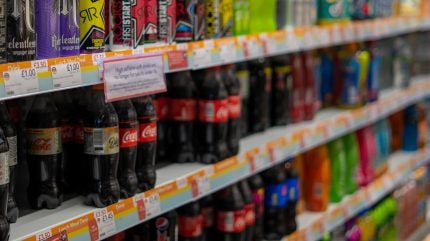
UK grocery inflation broke below the 10% barrier last month for the first time since June 2022, helped by a drop in the price of bread and cereals.
Both the CPI and CPIH measures published by the Office for National Statistics (ONS) eased to 9.2% for food and soft drinks in the 12 months to November, cooling for an eighth month in a row. The rates were down from 10.1% in October.
The pace of inflation for food and non-alcoholic beverages in November was the least since May 2022 in terms of the CPIH, which reached a peak of 19.2% in March this year, the highest in more than 45 years.
However, despite increases in the monthly CPI and CPIH grocery measures softening to 0.3%, from 1.1% in October, the ONS again flagged the historical burden still weighing on consumers.
“Although the annual inflation rate for food has been slowing, food prices are still high following relatively sharp rises over the latest two years,” the ONS said today (20 December).
“The overall price of food and non-alcoholic beverages rose by around 27% over the two years between November 2021 and November 2023. This compares with a rise of around 9% over the ten years between November 2011 and November 2021.”

US Tariffs are shifting - will you react or anticipate?
Don’t let policy changes catch you off guard. Stay proactive with real-time data and expert analysis.
By GlobalDataWhile trade boy The Food and Drink Federation (FDF) welcomed the easing burden of cost pressures on consumers as the country enters the Christmas period – with the ONS’ headline rates also cooling in November – the UK industry body pointed to the continuing stresses on manufacturers.
The FDF also warned of the risk of a resurgence in inflation for the sector from historically high cocoa prices and the potential uplift to global shipping rates caused by bottlenecks on traffic through the Panama Canal.
The disruption, due to below-average water levels caused by drought, has been compounded by shipping companies re-routing vessels away from the Suez Canal in Egypt because of increasing attacks from Houthi militia in the Red Sea.
“Our industry is very conscious of the pressure on household budgets at Christmas time and food and drink manufacturers continue to do all they can to keep prices as low as possible for consumers," Balwinder Dhoot, the FDF’s director of sustainability and growth, said in a statement.
“While agricultural commodity prices are generally falling, they remain 21% higher than they were pre-pandemic. There have been significant price rises in cocoa - reaching a 25-year high, while olive oil prices are almost double than a year ago.
“The recent navigation turmoil in the Red Sea will likely add to inflationary pressures on our sector, with global shipping rates increasing by 10% since the start of the month.”
Away from food, the ONS’ headline inflation rates eased more than expected in November. CPIH cooled to 4.2% - the lowest level since October 2021 - from 4.7%. It peaked at 9.6% in October last year, the highest in more than 40 years.
The CPI measure pulled back to 3.9% - the least since September 2021 - from 4.6%, having reached 11.1% in October 2022, the most in more than 45 years.
Monthly rates fell in November, with CPIH dropping 0.1%, compared to a 0.4% rise in October, and the CPI declined 0.2% versus a 0.4% increase.
Returning to food and soft drinks, the ONS said the easing in the annualised rates was driven by a 0.8% decrease in the cost of bread and cereals. And to a lesser extent, “downward contributions” from meat, milk, cheese, eggs and soft drinks.



